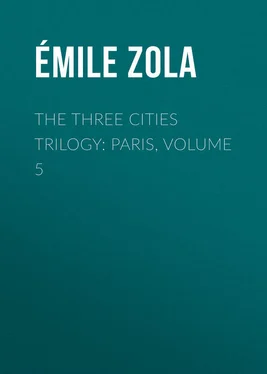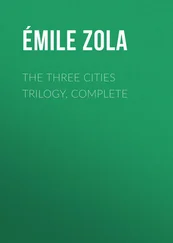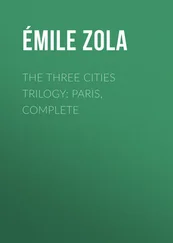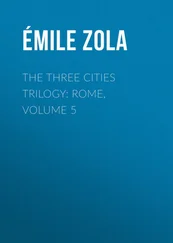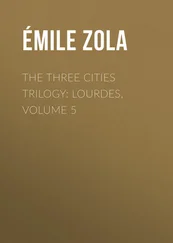Émile Zola - The Three Cities Trilogy - Paris, Volume 5
Здесь есть возможность читать онлайн «Émile Zola - The Three Cities Trilogy - Paris, Volume 5» — ознакомительный отрывок электронной книги совершенно бесплатно, а после прочтения отрывка купить полную версию. В некоторых случаях можно слушать аудио, скачать через торрент в формате fb2 и присутствует краткое содержание. Жанр: literature_19, foreign_antique, foreign_prose, на английском языке. Описание произведения, (предисловие) а так же отзывы посетителей доступны на портале библиотеки ЛибКат.
- Название:The Three Cities Trilogy: Paris, Volume 5
- Автор:
- Жанр:
- Год:неизвестен
- ISBN:нет данных
- Рейтинг книги:3 / 5. Голосов: 1
-
Избранное:Добавить в избранное
- Отзывы:
-
Ваша оценка:
- 60
- 1
- 2
- 3
- 4
- 5
The Three Cities Trilogy: Paris, Volume 5: краткое содержание, описание и аннотация
Предлагаем к чтению аннотацию, описание, краткое содержание или предисловие (зависит от того, что написал сам автор книги «The Three Cities Trilogy: Paris, Volume 5»). Если вы не нашли необходимую информацию о книге — напишите в комментариях, мы постараемся отыскать её.
The Three Cities Trilogy: Paris, Volume 5 — читать онлайн ознакомительный отрывок
Ниже представлен текст книги, разбитый по страницам. Система сохранения места последней прочитанной страницы, позволяет с удобством читать онлайн бесплатно книгу «The Three Cities Trilogy: Paris, Volume 5», без необходимости каждый раз заново искать на чём Вы остановились. Поставьте закладку, и сможете в любой момент перейти на страницу, на которой закончили чтение.
Интервал:
Закладка:
"Come, quick, then," said Massot, turning to the brothers, and taking them along with him.
A moment later, to the intense surprise of Pierre and Guillaume, the guards opened their ranks to let them pass. They then found themselves in the large open space which was kept clear. And on thus emerging from the tumultuous throng they were quite impressed by the death-like silence and solitude which reigned under the little plane-trees. The night was now paling. A faint gleam of dawn was already falling from the sky.
After leading his companions slantwise across the square, Massot stopped them near the prison and resumed: "I'm going inside; I want to see the prisoner roused and got ready. In the meantime, walk about here; nobody will say anything to you. Besides, I'll come back to you in a moment."
A hundred people or so, journalists and other privileged spectators, were scattered about the dark square. Movable wooden barriers – such as are set up at the doors of theatres when there is a press of people waiting for admission – had been placed on either side of the pavement running from the prison gate to the guillotine; and some sightseers were already leaning over these barriers, in order to secure a close view of the condemned man as he passed by. Others were walking slowly to and fro, and conversing in undertones. The brothers, for their part, approached the guillotine.
It stood there under the branches of the trees, amidst the delicate greenery of the fresh leaves of spring. A neighbouring gas-lamp, whose light was turning yellow in the rising dawn, cast vague gleams upon it. The work of fixing it in position – work performed as quietly as could be, so that the only sound was the occasional thud of a mallet – had just been finished; and the headsman's "valets" or assistants, in frock-coats and tall silk hats, were waiting and strolling about in a patient way. But the instrument itself, how base and shameful it looked, squatting on the ground like some filthy beast, disgusted with the work it had to accomplish! What! those few beams lying on the ground, and those others barely nine feet high which rose from it, keeping the knife in position, constituted the machine which avenged Society, the instrument which gave a warning to evil-doers! Where was the big scaffold painted a bright red and reached by a stairway of ten steps, the scaffold which raised high bloody arms over the eager multitude, so that everybody might behold the punishment of the law in all its horror! The beast had now been felled to the ground, where it simply looked ignoble, crafty and cowardly. If on the one hand there was no majesty in the manner in which human justice condemned a man to death at its assizes: on the other, there was merely horrid butchery with the help of the most barbarous and repulsive of mechanical contrivances, on the terrible day when that man was executed.
As Pierre and Guillaume gazed at the guillotine, a feeling of nausea came over them. Daylight was now slowly breaking, and the surroundings were appearing to view: first the square itself with its two low, grey prisons, facing one another; then the distant houses, the taverns, the marble workers' establishments, and the shops selling flowers and wreaths, which are numerous hereabouts, as the cemetery of Pere-Lachaise is so near. Before long one could plainly distinguish the black lines of the spectators standing around in a circle, the heads leaning forward from windows and balconies, and the people who had climbed to the very house roofs. The prison of La Petite Roquette over the way had been turned into a kind of tribune for guests; and mounted Gardes de Paris went slowly to and fro across the intervening expanse. Then, as the sky brightened, labour awoke throughout the district beyond the crowd, a district of broad, endless streets lined with factories, work-shops and work-yards. Engines began to snort, machinery and appliances were got ready to start once more on their usual tasks, and smoke already curled away from the forest of lofty brick chimneys which, on all sides, sprang out of the gloom.
It then seemed to Guillaume that the guillotine was really in its right place in that district of want and toil. It stood in its own realm, like a terminus and a threat. Did not ignorance, poverty and woe lead to it? And each time that it was set up amidst those toilsome streets, was it not charged to overawe the disinherited ones, the starvelings, who, exasperated by everlasting injustice, were always ready for revolt? It was not seen in the districts where wealth and enjoyment reigned. It would there have seemed purposeless, degrading and truly monstrous. And it was a tragical and terrible coincidence that the bomb-thrower, driven mad by want, should be guillotined there, in the very centre of want's dominion.
But daylight had come at last, for it was nearly half-past four. The distant noisy crowd could feel that the expected moment was drawing nigh. A shudder suddenly sped through the atmosphere.
"He's coming," exclaimed little Massot, as he came back to Pierre and Guillaume. "Ah! that Salvat is a brave fellow after all."
Then he related how the prisoner had been awakened; how the governor of the prison, magistrate Amadieu, the chaplain, and a few other persons had entered the cell where Salvat lay fast asleep; and then how the condemned man had understood the truth immediately upon opening his eyes. He had risen, looking pale but quite composed. And he had dressed himself without assistance, and had declined the nip of brandy and the cigarette proffered by the good-hearted chaplain, in the same way as with a gentle but stubborn gesture he had brushed the crucifix aside. Then had come the "toilette" for death. With all rapidity and without a word being exchanged, Salvat's hands had been tied behind his back, his legs had been loosely secured with a cord, and the neckband of his shirt had been cut away. He had smiled when the others exhorted him to be brave. He only feared some nervous weakness, and had but one desire, to die like a hero, to remain the martyr of the ardent faith in truth and justice for which he was about to perish.
"They are now drawing up the death certificate in the register," continued Massot in his chattering way. "Come along, come along to the barriers if you wish a good view… I turned paler, you know, and trembled far more than he did. I don't care a rap for anything as a rule; but, all the same, an execution isn't a pleasant business… You can't imagine how many attempts were made to save Salvat's life. Even some of the papers asked that he might be reprieved. But nothing succeeded, the execution was regarded as inevitable, it seems, even by those who consider it a blunder. Still, they had such a touching opportunity to reprieve him, when his daughter, little Celine, wrote that fine letter to the President of the Republic, which I was the first to publish in the 'Globe.' Ah! that letter, it cost me a lot of running about!"
Pierre, who was already quite upset by this long wait for the horrible scene, felt moved to tears by Massot's reference to Celine. He could again see the child standing beside Madame Theodore in that bare, cold room whither her father would never more return. It was thence that he had set out on a day of desperation with his stomach empty and his brain on fire, and it was here that he would end, between yonder beams, beneath yonder knife.
Massot, however, was still giving particulars. The doctors, said he, were furious because they feared that the body would not be delivered to them immediately after the execution. To this Guillaume did not listen. He stood there with his elbows resting on the wooden barrier and his eyes fixed on the prison gate, which still remained shut. His hands were quivering, and there was an expression of anguish on his face as if it were he himself who was about to be executed. The headsman had again just left the prison. He was a little, insignificant-looking man, and seemed annoyed, anxious to have done with it all. Then, among a group of frock-coated gentlemen, some of the spectators pointed out Gascogne, the Chief of the Detective Police, who wore a cold, official air, and Amadieu, the investigating magistrate, who smiled and looked very spruce, early though the hour was. He had come partly because it was his duty, and partly because he wished to show himself now that the curtain was about to fall on a wonderful tragedy of which he considered himself the author. Guillaume glanced at him, and then as a growing uproar rose from the distant crowd, he looked up for an instant, and again beheld the two grey prisons, the plane-trees with their fresh young leaves, and the houses swarming with people beneath the pale blue sky, in which the triumphant sun was about to appear.
Читать дальшеИнтервал:
Закладка:
Похожие книги на «The Three Cities Trilogy: Paris, Volume 5»
Представляем Вашему вниманию похожие книги на «The Three Cities Trilogy: Paris, Volume 5» списком для выбора. Мы отобрали схожую по названию и смыслу литературу в надежде предоставить читателям больше вариантов отыскать новые, интересные, ещё непрочитанные произведения.
Обсуждение, отзывы о книге «The Three Cities Trilogy: Paris, Volume 5» и просто собственные мнения читателей. Оставьте ваши комментарии, напишите, что Вы думаете о произведении, его смысле или главных героях. Укажите что конкретно понравилось, а что нет, и почему Вы так считаете.
